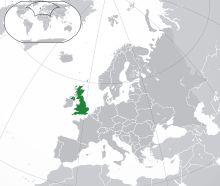Intersex rights in the United Kingdom
|
Intersex rights in the United Kingdom |
|
|---|---|

Location of the United Kingdom
|
|
| Protection of physical integrity and bodily autonomy | No |
| Reparations | No |
| Protection from discrimination | No / Yes (Jersey) |
| Access to same rights as other men and women | No |
| Changing M/F sex classifications | No |
| Third gender or sex classifications | No |
| Marriage | Not all |
| Rights by country | |
Intersex people in the United Kingdom face significant gaps in legal protections, particularly in protection from non-consensual medical interventions, and protection from discrimination. Actions by intersex civil society organizations aim to eliminate unnecessary medical interventions and harmful practices, promote social acceptance, and equality in line with Council of Europe and United Nations demands. Intersex civil society organizations campaign for greater social acceptance, understanding of issues of bodily autonomy, and recognition of the human rights of intersex people.
The island of Jersey has enacted limited protections from discrimination. These do not protect an intersex person from unwanted medical interventions, nor address other issues raised in the Malta declaration.
Henry de Bracton's De Legibus et Consuetudinibus Angliae ("On the Laws and Customs of England"), c. 1235, classifies mankind as "male, female, or hermaphrodite", and "A hermaphrodite is classed with male or female according to the predominance of the sexual organs." The 17th-century English jurist and judge Edward Coke (Lord Coke), wrote in his Institutes of the Lawes of England on laws of succession stating, "Every heire is either a male, a female, or an hermaphrodite, that is both male and female. And an hermaphrodite (which is also called Androgynus) shall be heire, either as male or female, according to that kind of sexe which doth prevaile." The Institutes are widely held to be a foundation of common law.
The first suggestion to replace the term 'hermaphrodite' with 'intersex', in medicine, came from British physician Cawadias in the 1940s. This suggestion was taken up by other physicians in the UK during the 1960s.
Historical intersex figures in the UK include Sir Ewan Forbes (1912-1991), 11th Baronet of Craigievar, Dawn Langley Simmons (1937 or 1922 to 2000), English author and biographer, and Georgina Somerset (née Turtle) (1923-2013), the first openly intersex person in the UK. Prominent present day individuals include "national LGBT treasure" Sarah Graham, writer Iain Morland, Lady Colin Campbell, author of Guide to Being a Modern Lady,Lisa Lee Dark, Welsh opera singer and voice actress, Dee Palmer of Jethro Tull, and Caroline Cossey.
...
Wikipedia
